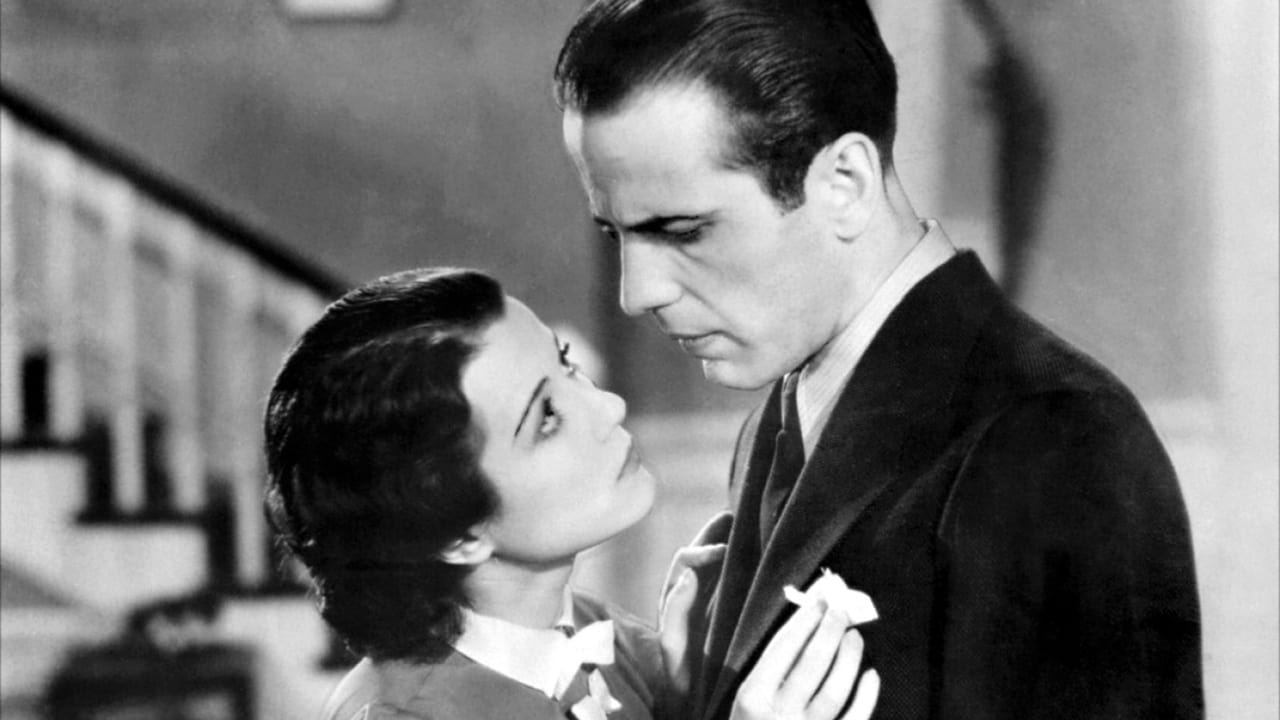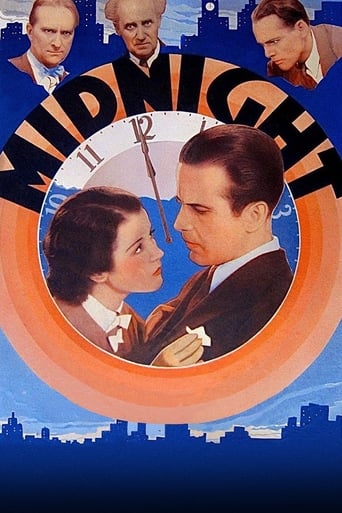

Somewhat stagy drama about a jury foreman (O.P. Heggie) who's very strict on law & order convicting a woman of murder and sending her to the chair. Everyone seems to be upset with the juror, including the press and his family. Of note today only because Humphrey Bogart's in it. Unfortunately he has a small part. It's not a bad film of its kind. Heggie is certainly a quality actor. Top-billed Sidney Fox plays his daughter, whose story is where Bogie fits into things. The rest of the cast is okay, with Henry Hull being the most remarkable. It's a movie that obviously has points to make about capital punishment and the legal system not being fair for all. But it's a bit creaky and drags and kind of falls on its face in the final act. Worth a look for Bogart completists. Also of interest to O.P. Heggie and Henry Hull buffs. If there aren't any, there should be!
... View MoreMidnight (1933) opens promisingly with the camera lovingly panning across numerous faces in a courtroom before settling on a nice close-up of Humphrey Bogart. Unfortunately, from here on, our interest takes a gradual nosedive – especially when we discover that Bogie's big climactic scene is not going to be played on camera at all but simply reported to us by Miss Sidney Fox. True, it's not Sidney's fault that Bogie is wasted, but she herself is rather colorless in this one – and at least one of the two directors bypasses Sidney altogether and allows stagey O.P. Heggie to collar the limelight. But it's Helen Flint's movie. In the small but vital role of the condemned murderess, she is utterly convincing. Available on a superb Image DVD. Incidentally, this is a 1933 production. The movie was produced independently and shown to various distributors before being picked up by Universal in 1933; and Universal was mostly interested because they had Fox under contract. Universal applied for the copyright in 1933, and said copyright was granted to Universal on January 2, 1934.
... View MoreMidnight was a film shot in New York by a whole bunch of Broadway players who had nothing else to do during afternoons when there were no matinees. By coincidence nearly the whole cast went on to Hollywood and appeared in productions better than this.O.P. Heggie plays the foreman of a jury that convicted a woman of first degree murder, thereby advancing the career of the District Attorney. On the night that the convicted woman is to die, in fact at the stroke of midnight, Heggie's daughter, Sidney Fox, kills her gangster boyfriend Humphrey Bogart who's running out on her.It's a crime of passion, just like the one that Heggie and the jury he led convicted that other woman for. I don't want to spoil the ending of this film if you're interested in seeing it. Let us just say that a District Attorney is a good friend to have.Fans of Humphrey Bogart will of course want to see this. Right after this Bogey appeared in The Petrified Forest on Broadway and came to Hollywood to do the film version. The rest is history, but if Bogey hadn't scored such a hit in The Petrified Forest, Midnight might well have been his screen epitaph. What a horrible thought.
... View MoreMIDNIGHT (Universal, 1934), directed by Chester Erskine, based on a stage play, is reproduced as such in this screen adaptation reportedly filmed and produced in New York City. Headed by Sidney Fox, in one of her final screen roles and last for Universal, she plays Stella, the daughter of Edward Weldon, a jury foreman (O.P. Heggie, the actor most famous today for his role as the blind hermit in THE BRIDE OF FRANKENSTEIN (1935)) at a trial where a woman, Ethel Saxon (Helen Flint) is accused of murdering a man who betrayed her. Because Weldon is solely responsible for the verdict that convicts Saxon to be later executed at midnight in the electric chair, his personal life changes dramatically. Weldon is not only hounded by reporters after the trial, particularly one named Nolan (Henry Hull, the future WEREWOLF OF London also in 1935) who manages to be a guest at his home on the night of Saxon's execution, but he must stand firm with his decision regardless. Stella, who had become acquainted with a man at the trial named Garboni (Humphrey Bogart), becomes interested in him, unaware that he is a gangster, but learns about him later on in the story when she notices that he carries a gun. When Garboni finds himself having to be forced to leave town, Stella wants to go away with him, but he refuses to let her do so, but agrees on meeting her one last time before he goes. On the very night of Ethel Saxon's execution, Stella and Garboni have a farewell meeting in his car. As the switch is being pulled on Saxon, a gun shoots off on Garboni. Returning home to her father with the gun in her hand, Stella admits to shooting Garboni, which puts the old man into a real predicament as to what to do. Should he stand by his own merits and have his own daughter arrested for the crime, or find a way to violate the law and shield her?Although the story premise is very interesting, especially the subject about a man who feels a murderer must pay the price, only to have his own daughter commit the same kind of crime of passion, MIDNIGHT fails to deliver mainly because of stiff, stagy production with not so convincing dialog. Under capable hands of a more suitable director, for instance, William Wyler, for example, MIDNIGHT might have worked as a tense and moving drama. Sidney Fox, who usually gives a satisfactory performance, seems to be the weakest link here, talking somewhat shaky at times for no reason. She's not very convincing, especially during her emotional scenes. Occasionally the camera shots moving at different angles keeps the pace moving, but not enough to hold one's interest at 73 minutes.Other capable members of the cast include Margaret Wycherly as Mrs. Weldon; future director Richard Wholf as Stella's brother, Arthur; Lynne Overman and Katherine Wilson as Joe and Ada Biggers, tenants of the Weldon household; Granville Bates, Cora Witherspoon, Henry O'Neill, and Moffatt Johnston as a district attorney who is called to the Weldon home to solve the mystery to Garboni's murder.To capitalize on the success of future film star Humphrey Bogart, MIDNIGHT was later reissued in 1946 as CALL IT MURDER with Bogey being given star billing, the very print available to video cassette and DVD. It's the former Blackhawk Video Company of Davenport, Iowa, that distributed the movie on videotape with it's original "Midnight" title, opening credits headed by SIdney Fox, O.P. Heggie and Henry Hill, with Bogart's name listed eighth in the cast, as initially presented in theaters in 1934.MIDNIGHT will never be listed in Hollywood's Top Ten Best list, but it's worth viewing for being an early screen appearance of future superstar Humphrey Bogart or a rediscovery of Sidney Fox, whose movie career (mostly at Universal) lasted only three years. Fox and Bogart had worked together earlier in THE BAD SISTER (1931), which not only became Fox's movie debut, but the future two-time Academy Award winning actress, Bette Davis. (***)
... View More